Salary growth for most key roles in the wine industry outpaced inflation in the past year, yet some average salaries declined.
According to the 2024 WineBusiness Monthly (WBM)/Western Management Group Salary Survey, the average base salary for all positions grew 1.9% over last year. That is the smallest year-over-year increase since 2021, when the average for all salaries grew by just 0.5% and less than the annual average increase since 2007, of 3.1%.
The 2024 survey is the 18th survey conducted by Western Management Group (WMG). In recent years, WMG's work has been supplemented by an additional survey by WineBusiness Analytics to better account for wineries that produce fewer than 50,000 cases a year. The survey is based on data collected from wineries across the United States and features comprehensive compensation data on key winery roles in sales, winemaking and grapegrowing.
The average increase for salaries collected by WMG was 3.8% while it was 5.3% among companies in the WineBusiness survey. Of all the salaries collected, 74% increased, 16.2% decreased and 9.8% saw a change of less than 1%. With the overall average increase remaining positive and some positions seeing comparably large salary increases, wine industry wages are in step with the wider U.S. economy in staying ahead of inflation. According to an analysis by the non-partisan Economic Policy Institute, average wages have outpaced inflation since it fell to 3% in June 2023.
WMG's survey also found that men account for a higher share of eight of 11 key job categories with only entry level exempt, career exempt and specialist exempt roles having a higher share of women than men. Average base pay for men is higher than woman in all but two employment categories: non-exempt led where women earn 5.6% more and supervisor where average pay for women is 1% higher.
Like last year, WMG also found 81% of all wine industry employees work on site, or in an office, while 4% work from home, 10% are in the field and the remaining 5% work from a combination of all three.
Executive Roles See Salary Declines
Last year's survey found the largest increase in average base salary was 17.2% for the role of special events coordinator. That position was one of the few that saw a decrease this year, declining 2.6% to $58,474. Other average salaries with declines included executive vice president of sales falling 3.5% to $277,711. General manager declined 2% to $213,074 and the average salary for president was down 1% to $309,055.
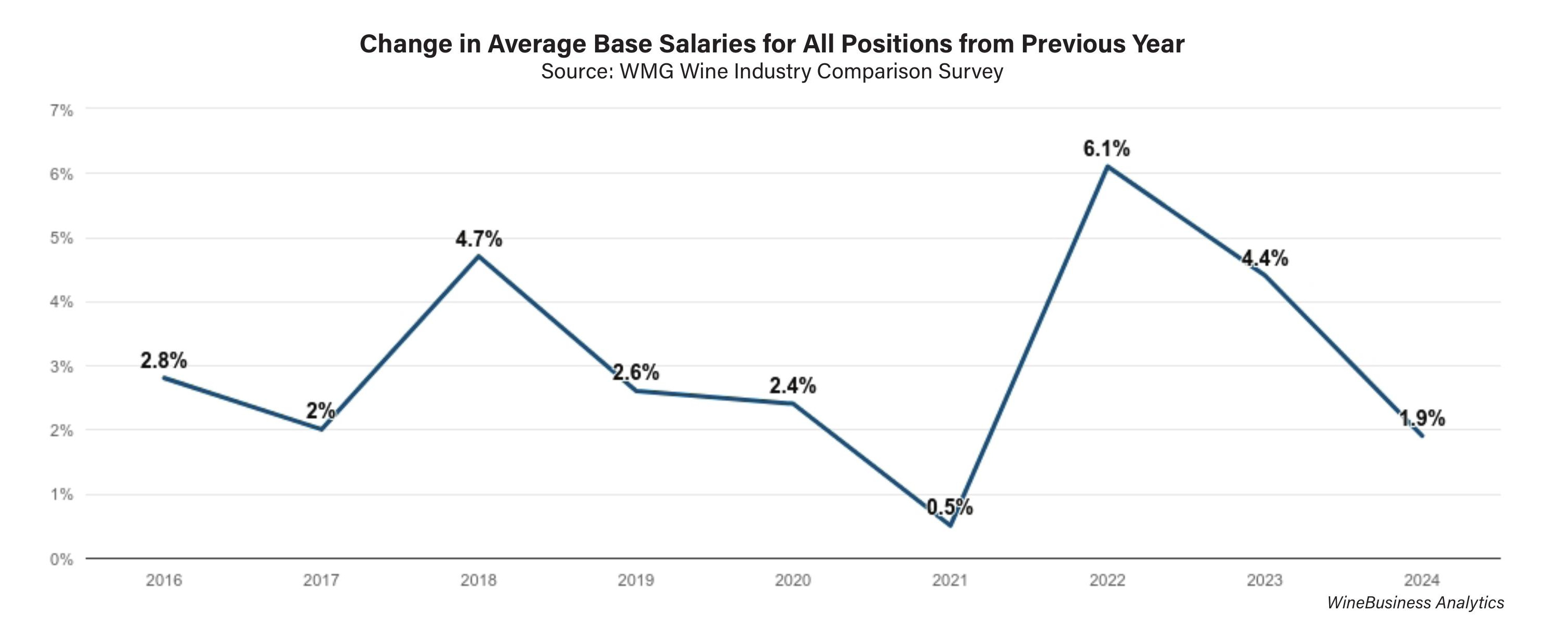
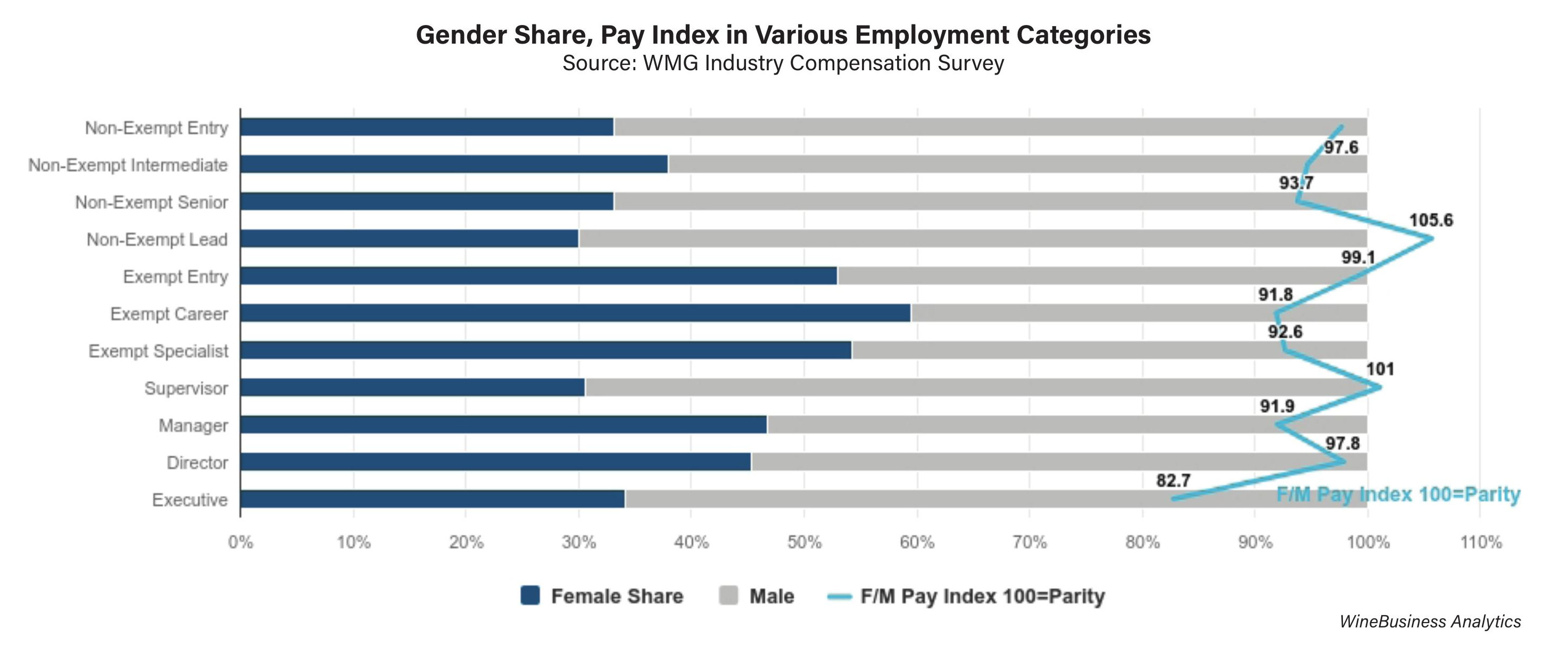
Last year's dramatic increase in pay for the special events coordinator position may have reflected the unique circumstances of the post-pandemic competition among wineries to offer more experiences in the competition for wine country visitors. The decline in average salary for the role this year may reflect wineries creating the position or hiring younger, less experienced staff for the role. Declines among top executive positions may reflect the challenge of hitting sales goals in a total U.S. wine market defined by little to no growth. Some of the largest salary increases found by this year's survey occurred for positions in production with the average base salary for winemaker 2 roles increasing 7.4% to nearly $150,000 a year, while the average base pay for winemaker 1 rose by more than 5% to nearly $118,000 a year. The average base salary for cellar worker 2 was up 6% to slightly more than $52,000 and the average salary for cellar master increased 3.9% to $92,183.
Compared to other key roles, growth in winemaking pay has lagged during the pandemic period. Since 2019, the average annual rate of growth in base salary for both winemaker 2 and 1 roles has grown by just 1.8% and 1.1% respectively.
That's nearly half the growth rate in average base salary for tasting room and wine club manager positions that have each grown at a rate of 3.6% per year. Compared to results from the 2019 survey, the growth in tasting room and wine club manager salaries is even more impressive with the average tasting room manager salary up 23% to $84,530 and the average wine club manager salary rising 24% to $86,000.
Bonuses Add Up for DTC Roles
Bonus pay is a significant component of compensation for direct sales and three-tier sales staff. The average bonus across all roles in 2024 was down slightly to $15,319 after reaching an all-time high of $15,926 in 2023. According to WMG the "merit budget," or share of total payroll allocated for the highest performers at a company for the wine industry is 3.4% while the national average is 3.8%.
Among wineries producing fewer than 50,000 cases, the most recent average fiscal year bonus for a tasting room manager at a Napa County winery was $22,616 but ranged from $2,289 to $65,000. Average total compensation for the role is $93,796 and ranged from $65,000 to $140,000. In Sonoma County, the average tasting room manager bonus was $12,562 and ranged from $1,250 to $20,000 with average total compensation ranging from $61,437 to $95,000.
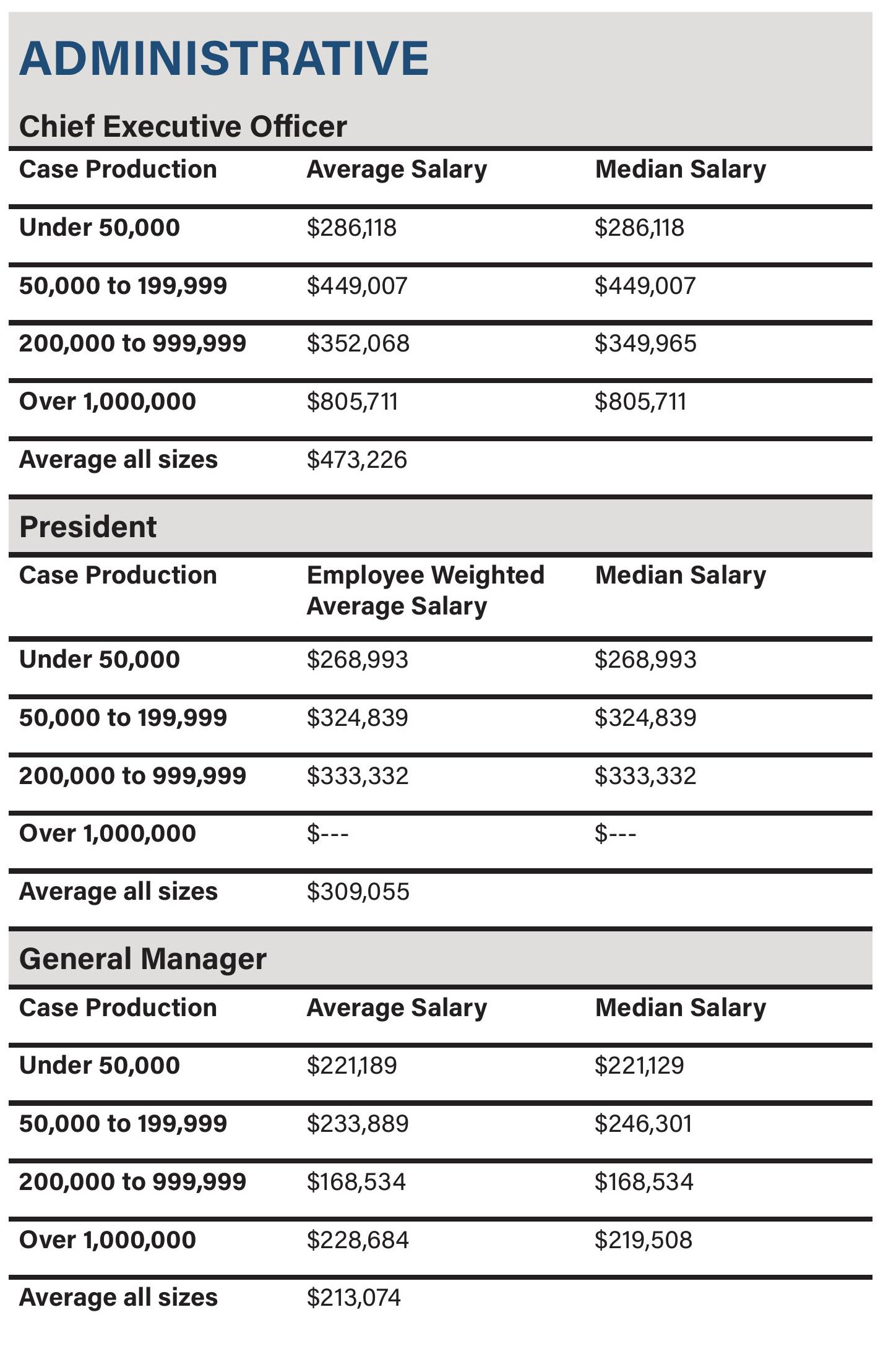
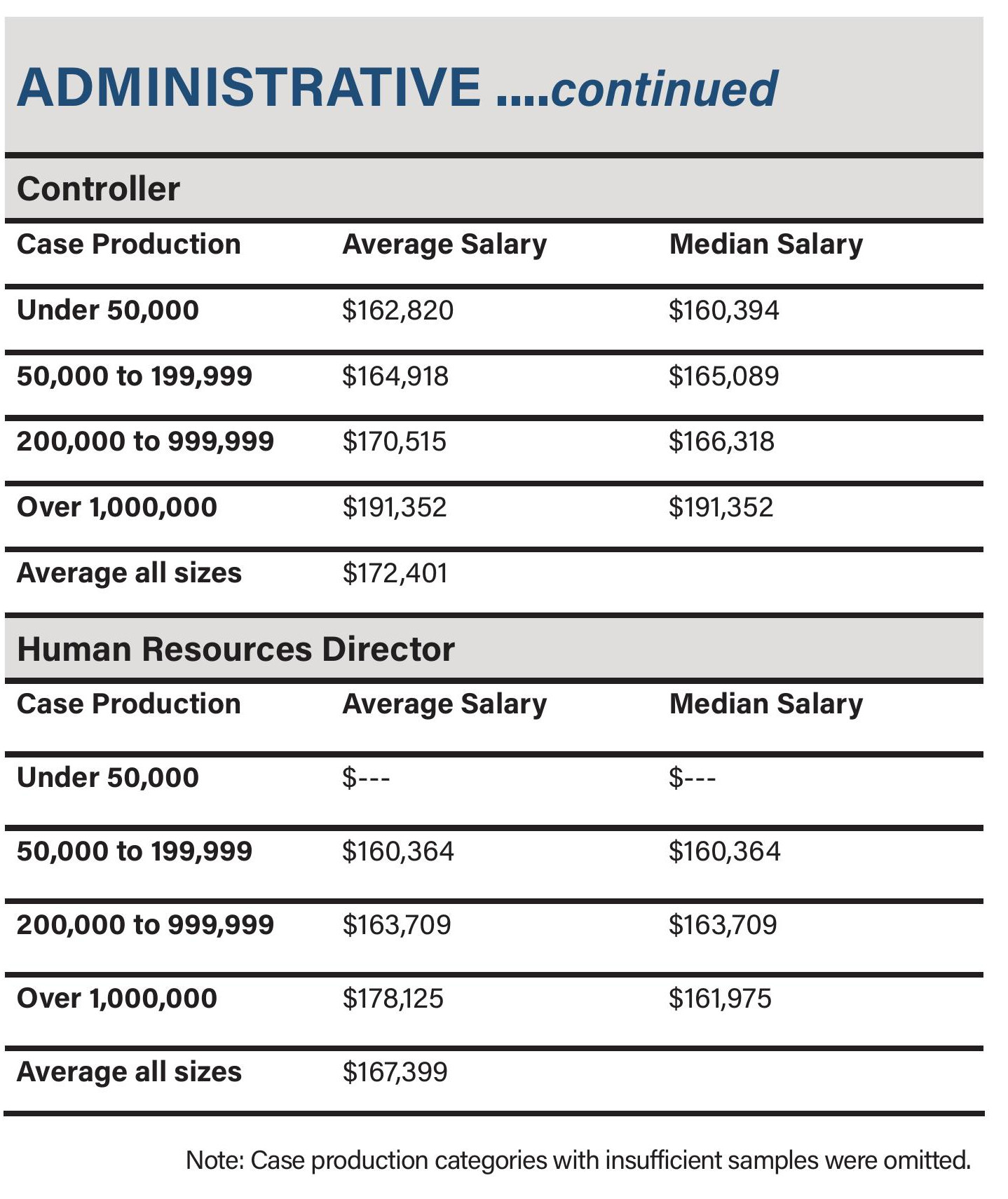
For winemakers, bonuses in Napa County ranged from $7,000 to more than $81,000 with the average total compensation ranging from $96,000 to $265,000. In Sonoma County, winemaker bonuses range from $4,390 to nearly $45,000 with average total compensation ranging from $70,000 to $196,504. The Chief Executive Officer position is the most lucrative position in the wine business with an average salary of $473,225 and which, according to the WMG survey, ranges from $286,118 for wineries producing fewer than 50,000 cases to $805,711 for those making more than 1 million cases.
At a similarly sized winery, a tasting room staff 2 role makes an average salary of $42,116 and that increases to $49,638 at wineries producing fewer than 50,000 cases.
It's the tasting room where human resources expert Joel Miller said the wine business has seen the biggest change in employee pay and compensation. Miller worked at several CPG industries and was heading up HR for the tech firm Newegg when he was recruited into a similar role at Jackson Family Wines, where he said he was one of the last executives to be personally hired by founder Jess Jackson.
Miller now runs the consulting firm ChateuHR and works with around two dozen clients on the West Coast regarding business strategy, HR, and organization consulting, and about half of those clients are wine companies. Miller is also an adjunct professor at the Wine Business Institute of Sonoma State University.
"The past three years have been volatile or turbulent," he told WBM. "We encountered some boom times and had more demand than supply for talent and that has equilibrated out quite a bit."
Through the recent period of disruptions, Miller said the impact of tasting room tips on tasting room pay has only become more pronounced. He said talented tasting room staff at popular wineries can earn up to 50% of their regular wages by just gratuities. "Some people are making boatloads of money through tips," he said.
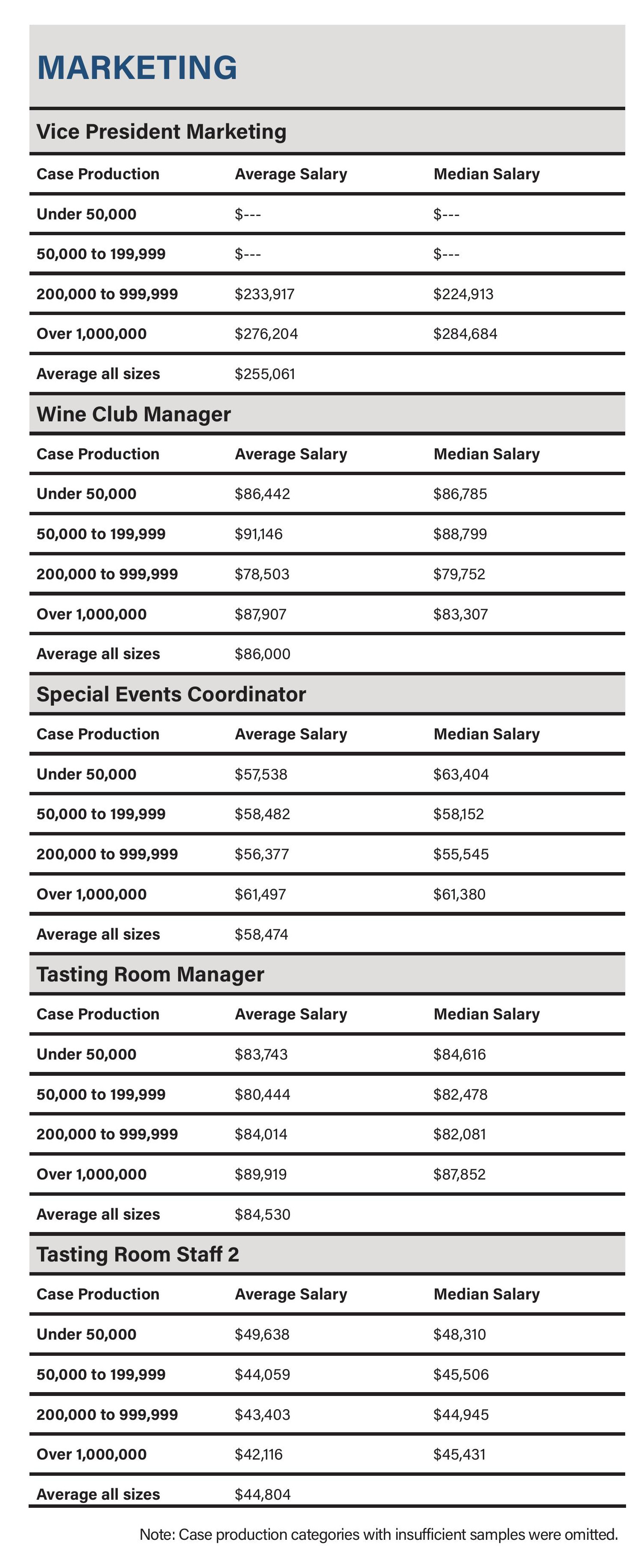
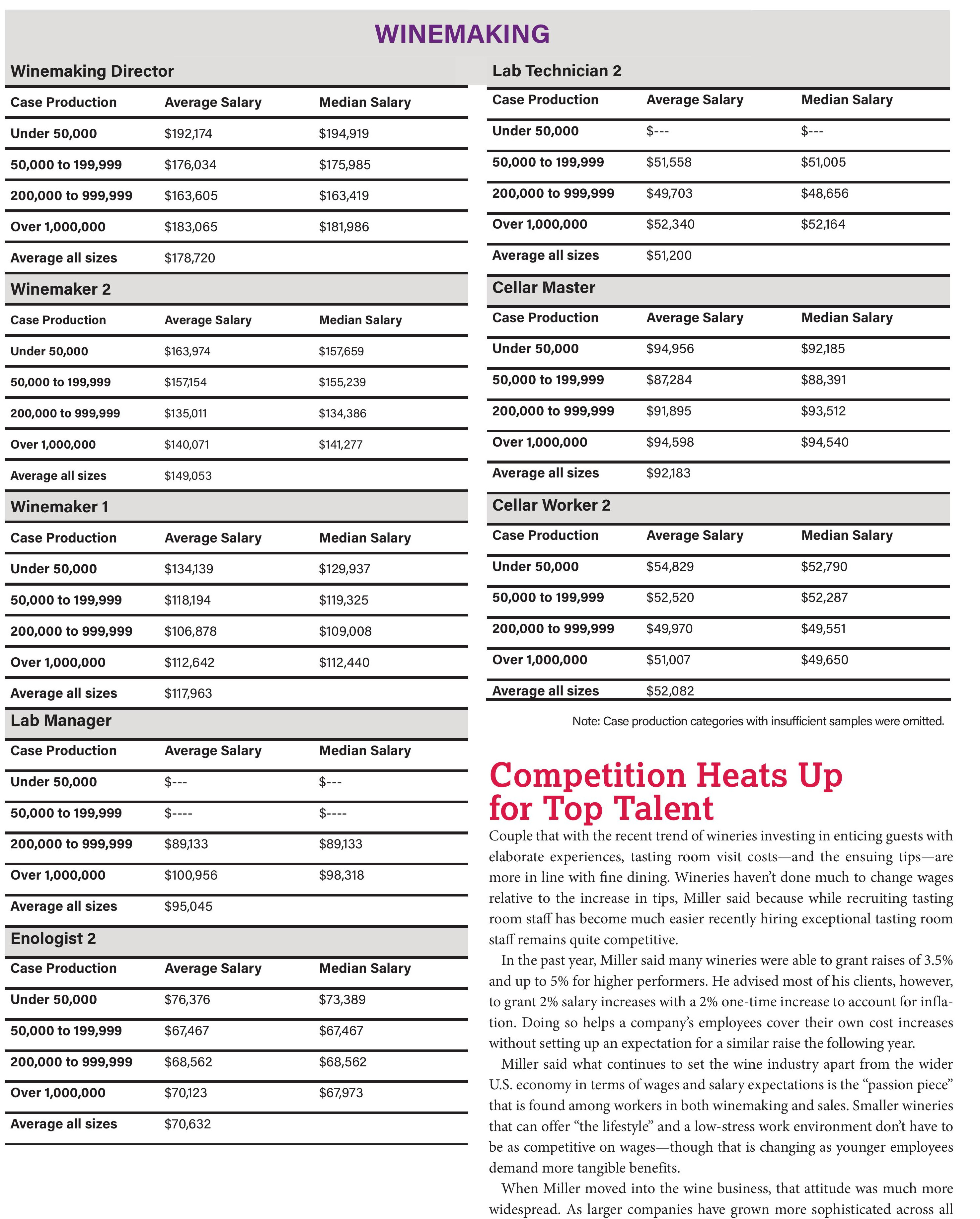
Competition Heats Up for Top Talent
Couple that with the recent trend of wineries investing in enticing guests with elaborate experiences, tasting room visit costs-and the ensuing tips-are more in line with fine dining. Wineries haven't done much to change wages relative to the increase in tips, Miller said because while recruiting tasting room staff has become much easier recently hiring exceptional tasting room staff remains quite competitive.
In the past year, Miller said many wineries were able to grant raises of 3.5% and up to 5% for higher performers. He advised most of his clients, however, to grant 2% salary increases with a 2% one-time increase to account for inflation. Doing so helps a company's employees cover their own cost increases without setting up an expectation for a similar raise the following year.
Miller said what continues to set the wine industry apart from the wider U.S. economy in terms of wages and salary expectations is the "passion piece" that is found among workers in both winemaking and sales. Smaller wineries that can offer "the lifestyle" and a low-stress work environment don't have to be as competitive on wages-though that is changing as younger employees demand more tangible benefits.
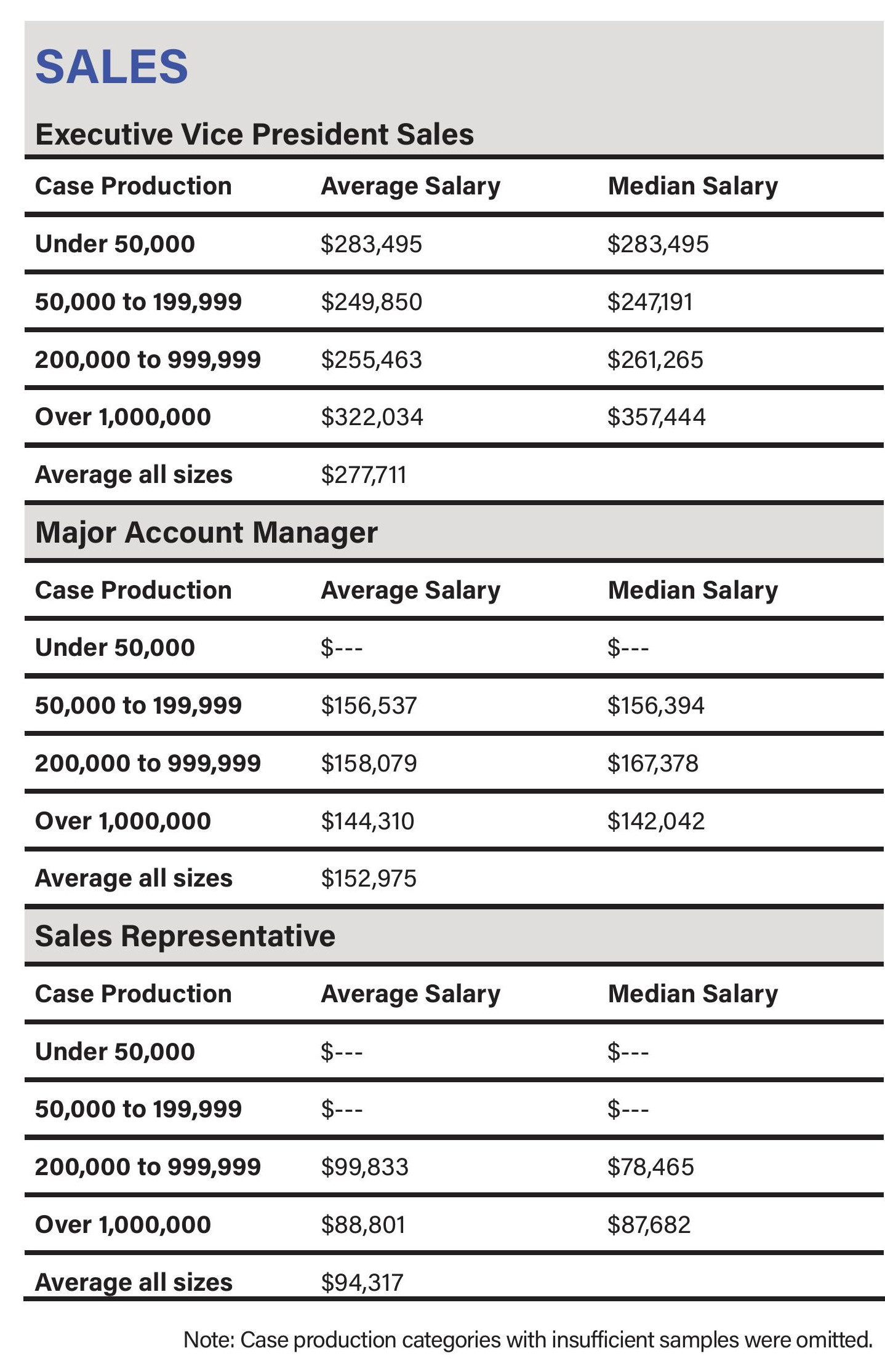
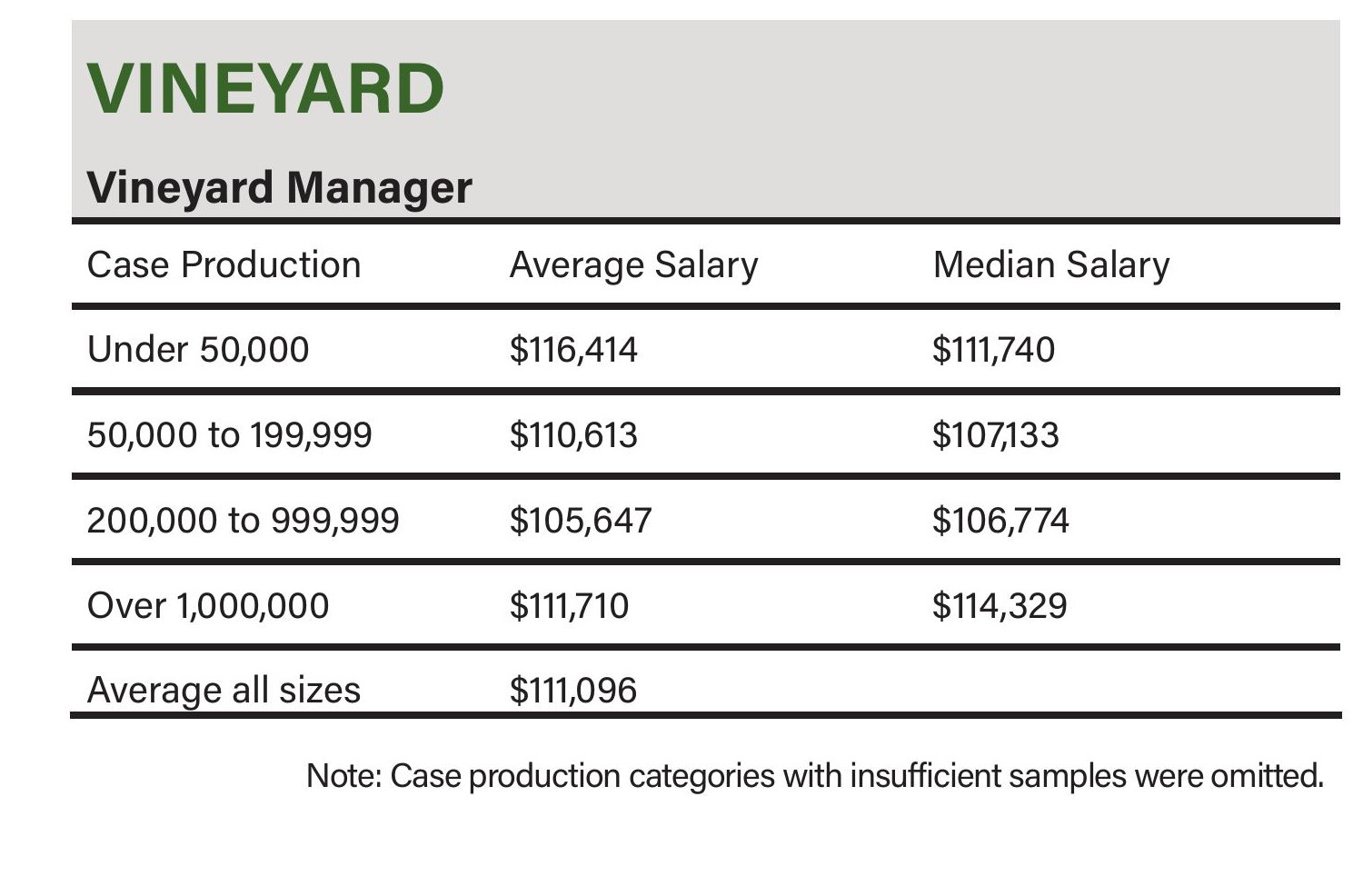
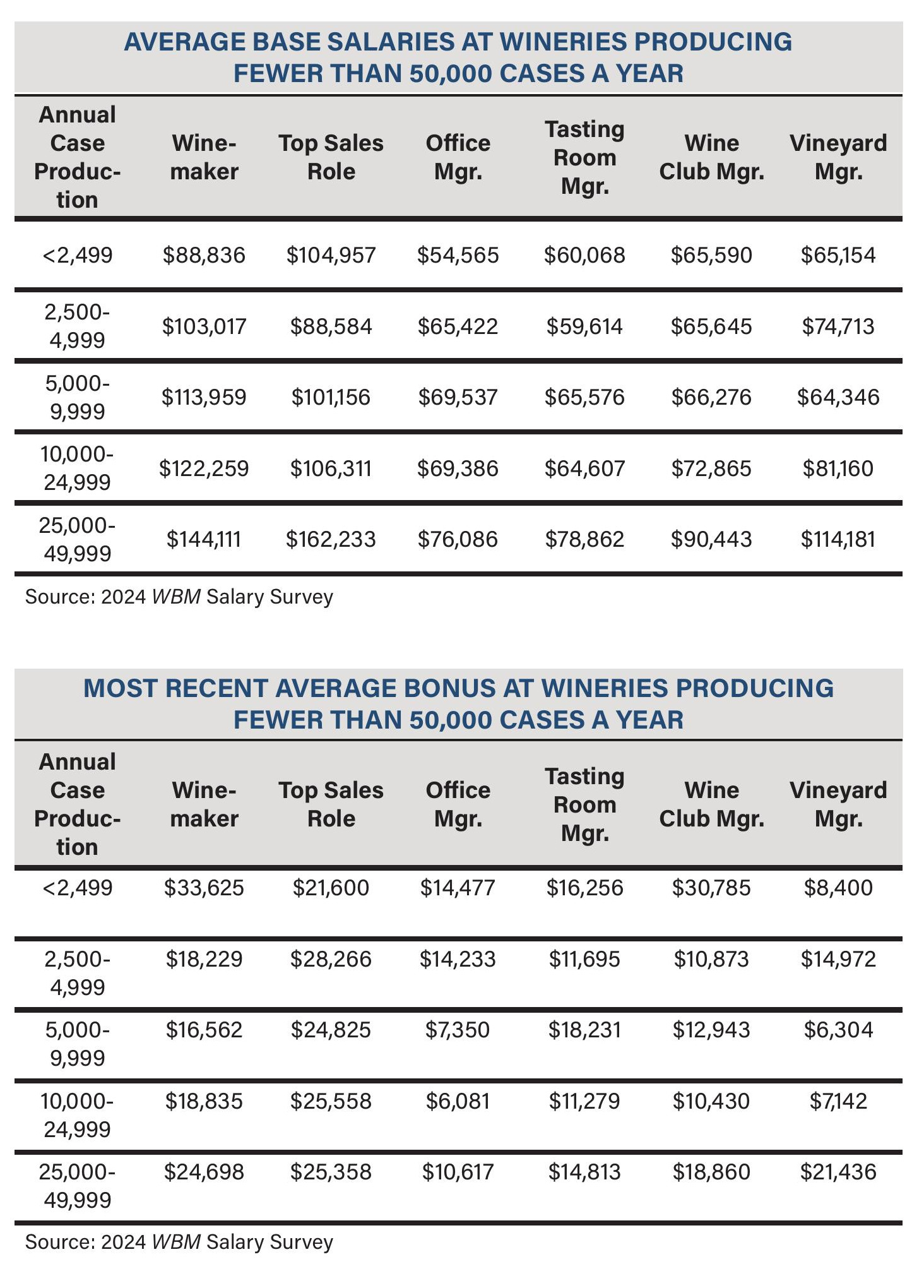
When Miller moved into the wine business, that attitude was much more widespread. As larger companies have grown more sophisticated across all operations the changed culture has spread to HR as well. "Larger companies continue to get more competitive and it's not that big of an industry, so we know the talent is out there and the competition for good talent is very intense," he said.
In addition to just recruiting for the best, wine companies are also becoming savvier at incorporating data analytics into all operations to better allocate costs and mete out bonuses and pay increases based on goals tied directly to profitability.
"The wine business is catching up to the value of a good GM and the value of a GM to the bottom line is night and day," he said.
METHODOLOGY:
For this survey, WineBusiness Monthly partnered with an independent consulting firm that specializes in compensation and salary surveys. The firm, Western Management Group, in Los Gatos, California, has conducted this salary survey since 1991. For more information, visit: www.wmgnet.com or call 408-596-7372, Donna Bowman, Survey Director.
The data was collected with an effective date of February 1, 2024. Regions include the following states: Mid-Atlantic (DC, DE, MD, NC, SC, VA, WV), Midwest (IA, IL, IN, KS, KY, MI, MN, MO, ND, NE, OH, SD, WI), Mountain (CO, MT, UT, WY) Northeast (CT, MA, ME, NH, NJ, NY, PA, RI, VT), Northwest (ID, OR, WA), Pacific (CA, NV), Southeast (AL, AR, FL, GA, LA, MS, TN) Southwest (AZ, NM, OK, TX).


